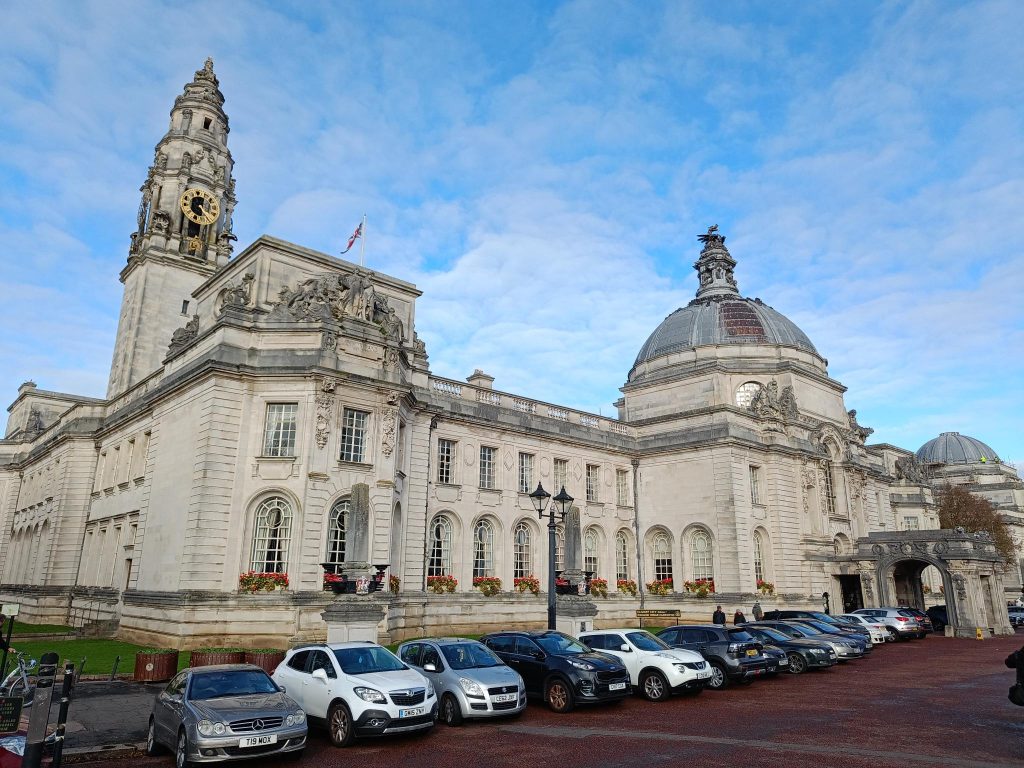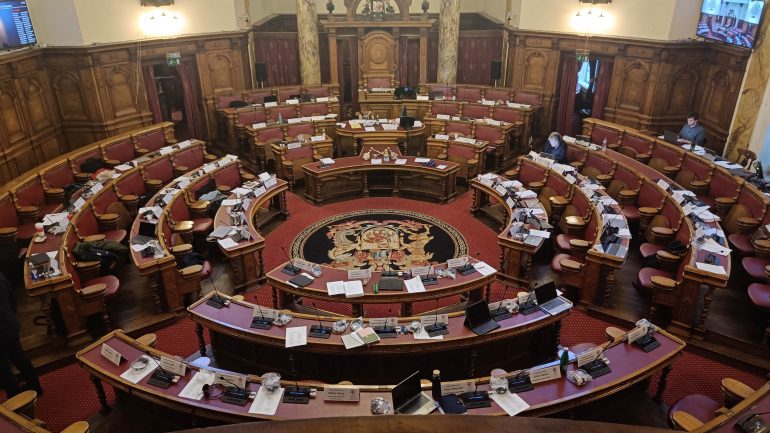Ahead of Cardiff Council’s budget meeting, The Cardiffian sat down with the leader of the city’s Conservatives to discuss their proposals
CARDIFF CONSERVATIVES say they would privatise bin collections and freeze council tax as part of their alternative budget for 2023-24.
“We will be looking to propose a council tax freeze,” said Adrian Robson, the leader of the Conservatives.
“We believe the money is there to do it without affecting frontline services.”
The budget response comes as Cardiff Council looks to fill a £23.5m hole in its finances, due to a combination of inflation-related cost increases and increased demand for services.
- Read more about Cardiff Council’s budget proposals here
Cardiff Conservatives argue that the council isn’t dipping deep enough into cash reserves, claiming that an extra £4.5m on top of the £14.5m in reserve money the council is already using could go toward reducing the burden on Cardiff taxpayers.
The opposition party also proposes:
- Reversing the proposed lease of St David’s Hall to AMG/Live Nation
- Moving £0.5m in the capital budget from cycleways to buses
Cllr Huw Thomas, Leader of Cardiff Council, has previously disagreed with the idea of raiding reserves to fill a budget gap, saying: “I think it’s too easy to just pocket contingency money.”
The council argues that reserves should not be used for day-to-day funding for two main reasons. Firstly, it says doing so will create larger budget gaps in future years. The argument is that the cash will not be available after it’s been spent, but extra funding commitments will remain.
Secondly, it claims that the reserves do not just sit there; a large proportion of them are earmarked for a specific purpose, and they generate passive income in the shape of interest payments.
The council also faces the gloomy forecast of a budget gap in excess of £110m over the next four years, with public finances set to tighten further.

The alternative policy proposals were put forward by Cllr Adrian Robson in a Q&A with The Cardiffian today. You can read the interview below.
You have been critical of a number of the council’s budget proposals, so what is the Conservative alternative?
“We’re currently seeing a council tax rise of almost 4%. As a group, we think that’s much too high. We see a difficult financial climate for many people, right across our city and we will be looking to propose a council tax freeze. We believe the money is there to do it without affecting frontline services.
“We would also reverse the proposed change to St David’s Hall. That would cost us around half a million pounds. So, we would keep it under the current arrangements and make improvements down the line in-house.
“Our net capital budget is equal to the administration’s. However, we would move half a million out of the strategic cycleway improvement programme and redirect to the bus corridor improvement programme. We believe that there’s a lot of cycling infrastructure already, we now need to start getting our buses running to get people back on by making them more convenient, reliable and affordable.”

How are you going to fund the additional revenue expenditure?
“There’s a lot of money in the council’s reserves. We would use this to get council tax down to a freeze this year. Even with our proposals we would still leave £90m in the earmarked reserves and £13.5m in the general reserve. So, you’re talking over £100m in total.
“We would also take the £1m left in the council’s budget contingency fund. This was a fund put forward by the council 11 years ago, in case their savings were not robust enough. We view this as a waste of money. If your savings are not robust enough to be achieved, why put them forward in the first place?
“This would give us around £6.5m on top of what there already is to bring council tax down.
“We would also like to see more regional working. Not long ago, we saw Cardiff’s procurement department go into an agreement with Monmouth. Other sections have also merged, including the shared regulatory services with the Vale and Bridgend. There should be more of this, which would generate efficiencies through economies of scale.
“We would also temporarily let office space in County Hall. We understand that there is a proposal to get rid of the building, but we can’t see that happening in the next two years. There is shortage of start-up spaces in the city and we believe that we could raise a significant sum of money by letting out what is unused space in County Hall.
“Since the pandemic, home working has meant that County Hall is not as full as it used to be. If they rearranged the building sensibly, there should enough space to let out to small businesses. We realise this isn’t a long-term option because County Hall will go, but in the meantime there’s the opportunity to generate some revenue.
We think it’s time to look at the private sector getting involved in waste management
“We are also looking closely at waste management. We’re putting in a suggestion that it be outsourced this time around to the private sector. Some of the benefit would obviously be offset by start-up costs. However, we see issues with sickness absence not falling in the same way that it has in other areas of the council. We think it’s time to look at the private sector getting involved.”
While Cardiff Council is raising it by nearly 4% this year, that’s still significantly lower than the average hike for Welsh local authorities. Are you at all sympathetic to this?
“You’re right. There have been some outliers. We’ve recently seen a 10% rise in Conwy and an 8.5% rise in Newport. Unfortunately, I think there’s some politics at play here. We’re in year one of a five year administration and I think some administrations see it as the time to raise funds.
“I think that Cardiff, coming in at 4%, is in line with budget modelling. Nevertheless, I just believe we can go further. We’re not affecting frontline services by going that extra mile and getting it down to 0%.”
Also, on council tax, your group are opposing the council’s plans to put a premium on second homes. Could you elaborate on this a bit?
“Sure, we don’t see second home ownership as a serious issue for Cardiff. I’m sympathetic to the policy being used in Carmarthenshire, Pembrokeshire and Gwynedd. However, in Cardiff, people who have second homes are often business people who genuinely have a strong use for a second property.
“We don’t hear of secondary homes driving people out of Cardiff in the same way you do in rural – particularly coastal – communities. Why should people bringing business into the city be punished? If anything, they use less public services.”
On St David’s Hall, your group has voiced concerns that AMG/Live Nation would have a monopoly on Cardiff’s live entertainment market. Is this your only objection to the deal?
“It’s a bit of that, it’s also a bit of that AMG are not – to my knowledge – a classical events specialist. They put on very good concerts and will obviously be running the bay arena when its built, alongside the Cardiff International Arena in the city centre.
“However, the classical music world is very concerned by the proposal. You have to bear in mind that it is the National Concert Hall of Wales, so it’s a real masterpiece in terms of a venue for classical music to be performed at its very highest levels.
“It’s the only concert hall, I believe, of that quality in Wales, so there are real concerns about it being diminished. We are worried that orchestras, and even some the smaller groups that perhaps don’t get full hall attendance, will be affected in a year or two – perhaps even edged out.”
Are you at all comforted by the council’s guarantee that there will be a minimum of 85 days per year reserved for classical music under the new lease?
“I think it’s more of a concern around the new arrangements. That figure is obviously welcomed, but it’s the fact that it’s not just a normal concert hall – it’s Wales’ national venue.
It’s the fact that it’s not just a normal concert hall – it’s Wales’ national venue
“Our group’s view is that the Welsh Government should have a hand in running it because it’s such an important asset to the country. Unfortunately, it seems it seems they have declined to do that.
“We think that AMG will run it in line with the contract for the first couple of years, but what happens if the climate changes?
“AMG are pop music specialists and that’s where their business model is. What’s the first thing to go when a business need to make changes? It’s going to be the classical programme that’s not quite as popular and profitable.”
The council would also argue that the building needs significant investment alongside the subsidy it already gets. How would you address that?
“It does need infrastructure investment and the money is there – look at the reserves. I’m not against private sector involvement completely, I just think that this particular deal is set up to be a detriment to the classical offering. You will need other sources of income on it, I just worry about what you are left with if you lease the whole thing out.”
On your use of the council’s reserves. Once they’re gone, they’re gone. Are you not concerned about dipping into them when the medium-term forecast for council settlements is so gloomy?
“The administration themselves are using £14.5m out of the earmarked reserves for various aspects, we’re looking to take out an extra £4.5. I appreciate we’re taking more, but I think reserves are there for a rainy day. If this isn’t a rainy day for our Cardiff residents, with the financial situation that many are facing with their bills, then what is?
“As a council, the one bill that we can affect in almost every household is council tax. There have been years where I haven’t tabled amendments, but I have for the past few years because with everything going on, we should be acting to help people – a 0% tax rise is a good way of doing that.”
Just continuing on the medium-term finances, the council is forecasting – albeit uncertainly – a budget gap of in excess of £110m over the next 4 years. Do you think local authorities are being funded properly?
“No, I don’t think they are. A lot of the problems for local councils fall at the feet of the Welsh Government. I think there is a lot of spending on projects and initiatives that will have little impact within Wales.
“Money has to come from the pot somewhere and I think they really need to start looking at the local government and the services it provides. Especially social care, with that and education being our biggest spends by a long shot.
“The Welsh Government also needs to give more robust indicative figures. This year, we’ve gone from a budget shortfall of £53m to £24m. It’s great that there’s a much smaller gap, but there would have been time and effort expended on preparing for the bigger one. The uncertainty is just unfortunate.
“Welsh Government will obviously blame Westminster, and you could argue Westminster has some role, but at the end of the day local government in Wales is funded by the Welsh Government.”
Just a couple of things on that. If the Welsh Government are responsible for underfunding local authorities, how do you explain the similar budget gaps that councils are seeing east of the border?
“Well, I can’t answer for councils in England, but obviously everyone is experiencing higher costs as a result of inflation. Of course, the amount of money that comes from Westminster is a factor, but Welsh councils are funded by Welsh Government, so the buck should stop there.”
And, just for the record, would you recognise that the level of disruption in Westminster this year has made it exceptionally difficult for forecasters – given delays to settlement announcements and drastic changes in policy?
“Yes, that has been a distraction, there’s no getting away from that.”



